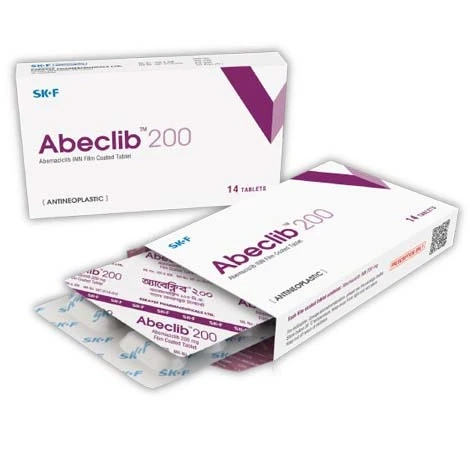Unit Price:
৳ 1,150.00
(2 x 7: ৳ 16,100.00)
Strip Price:
৳ 8,050.00
Also available as:
Indications
Abeclib is a kinase inhibitor indicated:
- in combination with endocrine therapy (tamoxifen or an aromatase inhibitor) for the adjuvant treatment of adult patients with hormone receptor (HR)-positive, human epidermal growth factor receptor 2 (HER2)-negative, node-positive, early breast cancer at high risk of recurrence and a Ki-67 score ≥20% as determined by an FDA approved test.
- in combination with an aromatase inhibitor as initial endocrine-based therapy for the treatment of postmenopausal women, and men, with hormone receptor (HR)-positive, human epidermal growth factor receptor 2 (HER2)-negative advanced or metastatic breast cancer.
- in combination with fulvestrant for the treatment of adult patients with hormone receptor (HR)-positive, human epidermal growth factor receptor 2 (HER2)-negative advanced or metastatic breast cancer with disease progression following endocrine therapy.
- as monotherapy for the treatment of adult patients with HR-positive, HER2-negative advanced or metastatic breast cancer with disease progression following endocrine therapy and prior chemotherapy in the metastatic setting.
* রেজিস্টার্ড চিকিৎসকের পরামর্শ মোতাবেক ঔষধ সেবন করুন
Pharmacology
Abemaciclib is an inhibitor of cyclin-dependent kinases 4 and 6 (CDK4 and CDK6). These kinases are activated upon binding to D-cyclins. In estrogen receptor-positive (ER+) breast cancer cell lines, cyclin D1 and CDK4/6 promote phosphorylation of the retinoblastoma protein (Rb), cell cycle progression, and cell proliferation. In vitro, continuous exposure to abemaciclib inhibited Rb phosphorylation and blocked progression from G1 into S phase of the cell cycle, resulting in senescence and apoptosis. In breast cancer xenograft models, abemaciclib dosed daily without interruption as a single agent or in combination with antiestrogens resulted in reduction of tumor size.
Dosage & Administration
Abemaciclib tablets are taken orally with or without food.
- Recommended starting dose in combination with fulvestrant, tamoxifen, or an aromatase inhibitor: 150 mg twice daily.
- Recommended starting dose as monotherapy: 200 mg twice daily.
- Dosing interruption and/or dose reductions may be required based on individual safety and tolerability.
* রেজিস্টার্ড চিকিৎসকের পরামর্শ মোতাবেক ঔষধ সেবন করুন
Interaction
CYP3A Inhibitors: Avoid concomitant use of ketoconazole. Reduce the Abeclib dose with concomitant use of other strong and moderate CYP3A inhibitors.
CYP3A Inducers: Avoid concomitant use of strong and moderate CYP3A inducers.
CYP3A Inducers: Avoid concomitant use of strong and moderate CYP3A inducers.
Side Effects
Most common adverse reactions (incidence ≥20%) were diarrhea, neutropenia, nausea, abdominal pain, infections, fatigue, anemia, leukopenia, decreased appetite, vomiting, headache, alopecia, and thrombocytopenia.
Pregnancy & Lactation
Based on findings from animal studies and the mechanism of action, Abemaciclib can cause fetal harm when administered to a pregnant woman. In animal reproduction studies, administration of abemaciclib to pregnant rats during the period of organogenesis caused teratogenicity and decreased fetal weight at maternal exposures that were similar to the human clinical exposure based on area under the curve (AUC) at the maximum recommended human dose. Advise pregnant women of the potential risk to a fetus. Advise females of reproductive potential to use effective contraception during treatment with Abemaciclib and for 3 weeks after the last dose.
Precautions & Warnings
Diarrhea: Abeclib can cause severe cases of diarrhea, associated with dehydration and infection. Instruct patients at the first sign of loose stools to initiate antidiarrheal therapy, increase oral fluids, and notify their healthcare provider.
Neutropenia: Monitor complete blood counts prior to the start of Abeclib therapy, every 2 weeks for the first 2 months, monthly for the next 2 months, and as clinically indicated.
Interstitial Lung Disease (ILD)/Pneumonitis: Severe and fatal cases of ILD/pneumonitis have been reported. Monitor for clinical symptoms or radiological changes indicative of ILD/pneumonitis. Permanently discontinue Abeclib in all patients with Grade 3 or 4 ILD or pneumonitis.
Hepatotoxicity: Increases in serum transaminase levels have been observed. Perform liver function tests (LFTs) before initiating treatment with Abeclib. Monitor LFTs every two weeks for the first two months, monthly for the next 2 months, and as clinically indicated.
Venous Thromboembolism: Monitor patients for signs and symptoms of thrombosis and pulmonary embolism and treat as medically appropriate.
Embryo-Fetal Toxicity: Can cause fetal harm. Advise patients of potential
Neutropenia: Monitor complete blood counts prior to the start of Abeclib therapy, every 2 weeks for the first 2 months, monthly for the next 2 months, and as clinically indicated.
Interstitial Lung Disease (ILD)/Pneumonitis: Severe and fatal cases of ILD/pneumonitis have been reported. Monitor for clinical symptoms or radiological changes indicative of ILD/pneumonitis. Permanently discontinue Abeclib in all patients with Grade 3 or 4 ILD or pneumonitis.
Hepatotoxicity: Increases in serum transaminase levels have been observed. Perform liver function tests (LFTs) before initiating treatment with Abeclib. Monitor LFTs every two weeks for the first two months, monthly for the next 2 months, and as clinically indicated.
Venous Thromboembolism: Monitor patients for signs and symptoms of thrombosis and pulmonary embolism and treat as medically appropriate.
Embryo-Fetal Toxicity: Can cause fetal harm. Advise patients of potential
Use in Special Populations
Pediatric Use: The safety and effectiveness of Abeclib have not been established in pediatric patients.
Geriatric Use: No overall differences in safety or effectiveness of Abeclib were observed between these patients and younger patients.
Renal Impairment: No dosage adjustment is required for patients with mild or moderate renal impairment.
Hepatic Impairment: No dosage adjustments are necessary in patients with mild or moderate hepatic impairment
Geriatric Use: No overall differences in safety or effectiveness of Abeclib were observed between these patients and younger patients.
Renal Impairment: No dosage adjustment is required for patients with mild or moderate renal impairment.
Hepatic Impairment: No dosage adjustments are necessary in patients with mild or moderate hepatic impairment
Therapeutic Class
Protein kinase inhibitor
Storage Conditions
Keep below 30°C temperature, away from light & moisture. Keep out of the reach of children.

